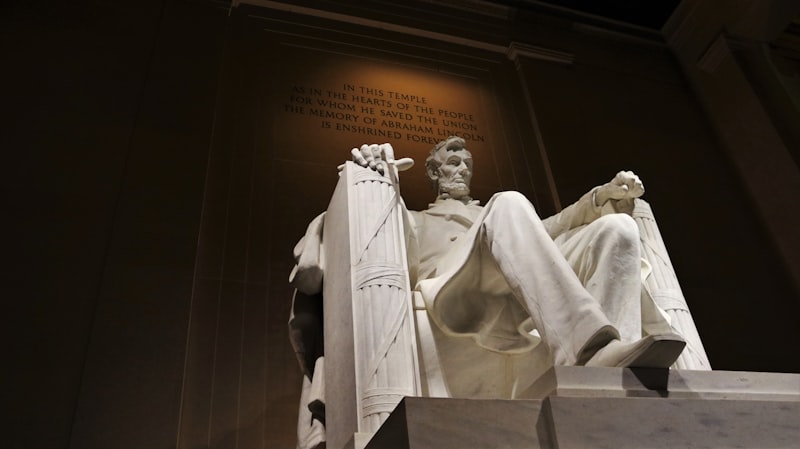Take Abraham Lincoln, for instance. His leadership during the Civil War not only preserved the Union but also paved the way for the abolition of slavery, fundamentally altering the course of American history. His Emancipation Proclamation and Gettysburg Address are timeless reminders of his commitment to equality and unity.
Moving forward, Franklin D. Roosevelt’s New Deal initiatives during the Great Depression reshaped the role of government in the economy, providing relief and hope to millions of Americans. His programs, such as Social Security and the FDIC, continue to impact American life decades later, offering a safety net for the vulnerable and promoting economic stability.
In more recent times, Ronald Reagan’s conservative agenda and advocacy for smaller government influenced a shift in economic policy and societal values. His tax reforms and emphasis on individual freedoms resonated with many Americans, shaping political discourse for years to come.
Barack Obama, the first African American president, symbolized a milestone in American history. His presidency focused on healthcare reform with the Affordable Care Act, aimed at expanding access to healthcare and addressing long-standing disparities.
Each president brings their unique background, vision, and leadership style to the Oval Office, leaving an indelible imprint on American society. Whether through legislative achievements, foreign policy decisions, or cultural influence, the presidency serves as a beacon of change and continuity in the ever-evolving landscape of the United States.
From Roosevelt to Biden: How U.S. Presidents Shaped Today’s America
The evolution of America, shaped by its presidents from Theodore Roosevelt to Joe Biden, is a fascinating journey through history. Each leader brought their own vision, policies, and challenges that left a lasting impact on the nation.
Theodore Roosevelt, known for his progressive era reforms, redefined the presidency by championing conservation efforts and trust-busting. His bold actions laid the groundwork for future presidents to tackle monopolies and advocate for environmental preservation.
Following Roosevelt, Franklin D. Roosevelt guided the nation through the Great Depression and World War II with his New Deal programs. His policies aimed to provide relief, recovery, and reform, setting a precedent for the federal government’s role in economic stability and social welfare.
Moving into the Cold War era, Harry S. Truman’s presidency was marked by the establishment of NATO, the Truman Doctrine, and the Marshall Plan, shaping America’s foreign policy strategy for decades to come. His decisions laid the groundwork for America’s global leadership and containment policy against Soviet influence.

The civil rights movement gained momentum under Dwight D. Eisenhower, who enforced desegregation in schools and signed the Civil Rights Acts of 1957 and 1960. His actions set the stage for the transformative civil rights legislation of the 1960s.
John F. Kennedy inspired a generation with his vision of progress and unity during the turbulent 1960s. His administration focused on civil rights, space exploration, and economic growth, though tragically cut short by his assassination in 1963.
Lyndon B. Johnson’s presidency is synonymous with the Great Society programs, which aimed to eliminate poverty and racial injustice. His leadership led to landmark legislation such as the Civil Rights Act of 1964 and the Voting Rights Act of 1965, shaping the social fabric of modern America.
Richard Nixon’s administration faced challenges with the Vietnam War and internal political scandals, yet he pursued detente with the Soviet Union and opened diplomatic relations with China, impacting global geopolitics.
Ronald Reagan’s presidency ushered in an era of conservative resurgence, advocating for tax cuts, deregulation, and a strong national defense. His economic policies, known as Reaganomics, influenced future debates on fiscal policy and government intervention.
Bill Clinton’s presidency saw economic prosperity and welfare reform, along with controversies such as impeachment proceedings. His policies on trade and the economy set the stage for the globalization era of the late 20th century.
Barack Obama made history as the first African American president, focusing on healthcare reform with the Affordable Care Act and economic recovery from the Great Recession. His presidency symbolized hope and change, inspiring a new generation of political engagement.
Donald Trump’s presidency was marked by populist rhetoric, economic nationalism, and controversies over immigration policies and international relations. His administration’s legacy continues to shape debates on America’s role in global affairs and domestic policy.
Joe Biden’s presidency has begun with efforts to address the COVID-19 pandemic, economic recovery, climate change, and social justice issues. His administration seeks to build on past policies while navigating new challenges in a divided political landscape.

Each president from Theodore Roosevelt to Joe Biden has left an indelible mark on America, shaping its identity, policies, and global influence. Their legacies reflect the evolving priorities and challenges of the nation throughout the 20th and 21st centuries.
The Legacy of Obama and Trump: A Comparative Analysis of Presidential Influence
Barack Obama and Donald Trump, two figures who have left indelible marks on American politics, offer a fascinating study in contrasts when it comes to their presidential legacies. Obama, known for his eloquence and measured approach, focused on healthcare reform with the Affordable Care Act (ACA) as his landmark achievement. His presidency also saw significant strides in economic recovery post-2008 recession and a renewed focus on renewable energy initiatives.
In contrast, Donald Trump’s presidency was marked by a disruptive style and a focus on economic nationalism. His tax cuts and deregulation policies aimed to stimulate economic growth, while his America First agenda reshaped U.S. trade relations and foreign policy. Trump’s tenure was characterized by unprecedented polarization, both domestically and internationally, with policies that sharply divided public opinion.
Analyzing their influence beyond policy, Obama’s legacy is often associated with hope and inclusivity, symbolizing progress on issues like LGBTQ+ rights and climate change awareness. His historic presidency as the first African American president of the United States inspired a generation.
On the other hand, Trump’s legacy reflects a more divisive era, marked by controversies and a populist surge that reshaped the Republican Party. His confrontational style and unconventional approach to governance challenged traditional norms and institutions.

While Obama and Trump operated within the same political framework, their approaches and impacts diverged significantly. Obama’s legacy embodies aspirations of unity and progressive change, whereas Trump’s legacy is characterized by disruption and a redefinition of conservative politics. Understanding their contrasting legacies provides valuable insights into the evolving landscape of American leadership and political discourse.
Behind the Policies: How U.S. Presidents Redefined Social Justice
In the annals of American history, the role of U.S. presidents in shaping social justice policies stands as a testament to the nation’s evolving ethos. From Abraham Lincoln’s Emancipation Proclamation to Lyndon B. Johnson’s Civil Rights Act, each leader has left an indelible mark on the pursuit of equality and fairness.
Abraham Lincoln, renowned for his steadfast leadership during the Civil War, issued the Emancipation Proclamation in 1863. This historic decree proclaimed freedom for slaves in Confederate states and paved the way for the eventual abolition of slavery nationwide. Lincoln’s actions not only altered the course of the war but also set a precedent for future presidents to address systemic inequalities.
Fast forward to the 20th century, where Franklin D. Roosevelt’s New Deal initiatives aimed to lift the country out of the Great Depression. While primarily economic in nature, Roosevelt’s programs, such as Social Security and labor reforms, laid foundational groundwork for a more equitable society. These policies not only provided relief to millions but also began to address longstanding disparities in wealth and opportunity.
Moving into the mid-20th century, the civil rights movement gained momentum, and President Lyndon B. Johnson took bold steps to enact sweeping legislative changes. The Civil Rights Act of 1964 and the Voting Rights Act of 1965 were monumental achievements that aimed to dismantle segregation and secure voting rights for African Americans. Johnson’s vision of a “Great Society” sought to combat poverty and promote social justice on a national scale.
In more recent decades, presidents have continued to grapple with issues of social justice, from healthcare reform under President Obama to criminal justice reform efforts under President Trump. Each administration has faced unique challenges and opportunities in advancing the cause of equality, reflecting the evolving priorities and values of the American people.
As we look to the future, the legacy of U.S. presidents in redefining social justice remains a dynamic and ongoing narrative. The decisions and policies of these leaders continue to shape the contours of American society, prompting us to reflect on how far we have come and how far we have yet to go in the pursuit of a more just and equitable nation.
Economic Milestones: Impact of Presidential Policies on American Prosperity

Imagine the economy as a grand ship navigating turbulent waters, with each presidential policy serving as its course correction. From tax reforms to trade agreements, these policies are the rudders guiding the ship towards prosperity or stagnation. But how exactly do these policies impact American lives?
Take, for instance, the Tax Cuts and Jobs Act of 2017, a landmark piece of legislation aimed at reducing corporate and individual tax rates. This policy shift was akin to trimming excess weight from the ship, allowing it to sail faster by encouraging investment and stimulating economic growth. As a result, many American households saw an increase in disposable income, while businesses found new opportunities to expand and innovate.
Similarly, trade policies can be likened to adjusting the sails of the economy. When tariffs are imposed or lifted, it alters the flow of goods and capital, affecting industries from manufacturing to agriculture. The renegotiation of trade deals, such as the USMCA replacing NAFTA, aimed to modernize trade relations and protect American workers, albeit with varying impacts across different sectors.
Presidential policies also extend beyond domestic affairs to global influence. Diplomatic decisions and international agreements ripple through the economy like waves in a pond, affecting everything from currency exchange rates to consumer confidence in the global market.
Yet, amid these policies and reforms, the true measure of their success lies in their lasting impact on the everyday lives of Americans. Are jobs more plentiful? Are wages rising? Is there greater economic security for families? These are the questions that reveal the true narrative behind economic milestones.
The impact of presidential policies on American prosperity is profound and multifaceted. Whether through tax adjustments, trade negotiations, or global diplomacy, each policy leaves its mark on the economic landscape, shaping the fortunes of millions and charting the course for future generations.
Breaking Barriers: How Presidents Have Advanced Civil Rights in America
Throughout American history, presidents have played pivotal roles in advancing civil rights, breaking barriers, and shaping the nation’s social landscape. From Abraham Lincoln’s Emancipation Proclamation to Lyndon B. Johnson’s signing of the Civil Rights Act of 1964, these leaders have navigated turbulent waters to promote equality and justice for all.

Abraham Lincoln, often revered as one of the greatest presidents, issued the Emancipation Proclamation during the Civil War. This historic document declared freedom for all enslaved people in Confederate territory, marking a significant step towards ending slavery and advancing civil rights.
Moving forward, Franklin D. Roosevelt’s New Deal policies aimed to alleviate the hardships of the Great Depression, but also laid foundations for future civil rights initiatives. His administration’s efforts included the establishment of programs that provided economic relief and employment opportunities, crucial steps in combating racial and economic inequalities.
The pivotal moment in the fight for civil rights came during the 1960s, with Presidents John F. Kennedy and Lyndon B. Johnson at the forefront. Kennedy’s advocacy for desegregation and civil rights legislation set the stage for Johnson’s impactful presidency. Johnson’s determination culminated in the signing of the Civil Rights Act of 1964, a landmark piece of legislation that outlawed discrimination based on race, color, religion, sex, or national origin.
Moreover, Johnson’s commitment to social justice extended to the Voting Rights Act of 1965, which aimed to eliminate racial discrimination in voting. These legislative triumphs marked significant victories in the ongoing struggle for civil rights and equality.
Looking ahead, presidents continue to face the challenge of upholding and expanding civil rights in a rapidly changing society. Each administration’s approach and policies reflect the evolving dynamics of social justice and equality in America, illustrating the enduring impact of presidential leadership on civil rights advancements.
Presidents have historically served as catalysts for change, breaking barriers and championing civil rights despite challenges and opposition. Their legacies endure through legislative achievements and societal transformations, shaping the ongoing quest for equality and justice in America.
Frequently Asked Questions
What were the key social reforms initiated by U.S. Presidents?
Learn about key social reforms initiated by U.S. Presidents, highlighting impactful changes such as Roosevelt’s New Deal policies, Johnson’s Great Society programs, and Obama’s Affordable Care Act.
What cultural changes occurred due to the actions of U.S. Presidents?
This FAQ describes the cultural changes influenced by actions taken by U.S. Presidents throughout history. It succinctly outlines how presidential decisions and policies have impacted societal norms, values, and cultural trends in the United States.
How did U.S. Presidents influence civil rights movements?
Learn about the significant impact U.S. Presidents had on civil rights movements throughout history, from executive actions to legislative initiatives. Understand their roles in shaping policies, promoting equality, and addressing key social issues that shaped the course of civil rights progress in America.
How did U.S. Presidents impact healthcare and education?
Learn how U.S. Presidents have influenced healthcare and education policies throughout history, shaping access, funding, and standards.
What economic policies shaped modern American society under U.S. Presidents?
Discover how economic policies implemented by various U.S. Presidents have significantly shaped modern American society. Explore key initiatives such as New Deal reforms, deregulation trends, tax reforms, and international trade policies that have influenced economic growth, social welfare, and the overall landscape of the United States.



